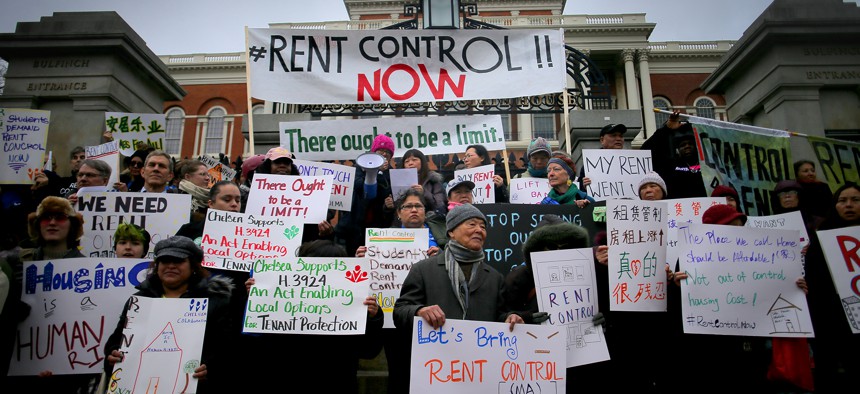Despite the controversy, cities are still turning to rent control to address the housing crisis

Renters' rights groups rally outside the Massachusetts State House in Boston in 2020. Lane Turner/The Boston Globe via Getty Images

Connecting state and local government leaders
Many cities have adopted rent control measures in the past year to help with the high cost of housing. But the approach has had less success in statehouses, where opponents argue it’s ineffective.
As cities and states continue to grapple with the affordable housing crisis—now without much of the federal aid made available during the pandemic—rent control proposals are a hot topic of debate. The measures appear to be garnering support in city halls and among tenant organizers, but are finding less success in statehouses.
“There's a number of advocates that are trying to work on rent stabilization,” said Marie Claire Tran-Leung, evictions initiative project director at the National Housing Law Project.
“Especially in light of inflation and rising rents over the last year, [there’s] an acknowledgement that there needs to be relief for tenants in some way.”
Still, rent control proposals have failed in several states this year. Even in places where measures have been approved, it hasn’t exactly been smooth sailing.
Measures meant to regulate rent—which typically involve capping how much landlords can increase lease payments—is a controversial practice. Some advocates say they keep residents in their homes, connected to familiar communities and protected from rent-gouging landlords. While opponents note that rent control can reduce maintenance funds—leading to low-quality housing—and sometimes fails to reach low-income households, allowing higher earners the opportunity to benefit from the cap.
Despite research underscoring the pitfalls of rent control, there’s been a massive push from residents and local officials to employ such measures, according to Jim Lapides, spokesperson for the National Multifamily Housing Council.
“The challenge for local elected officials is that they don't have a ton of levers that they can pull,” Lapides said. “We believe that the best way to help someone who can't afford the rent is to provide subsidies… but at the local level, politicians don't have the same kind of funding that you do at the federal level.”
At the end of last year, it looked as though 2023 was poised to be a big year for rent control, particularly after voters approved measures in several cities.
Last November, for instance, three localities in California—Pasadena, Richmond and Santa Monica—all approved measures to cap rent. In Portland, Maine, voters approved a measure that reduced the percentage landlords could increase rent by, and last month, rejected a ballot initiative that would have rolled back those changes.
This year, some cities have expanded rent control policies in response to rapidly increasing housing costs. Newark, New Jersey, approved a measure that caps increases at 5% annually and now includes newer buildings. (Rent control is often applied only to older buildings to avoid discouraging new development.) Washington, D.C.’s rent cap was reworked to limit rent increases to 6% for the next two years. And lawmakers in Oregon, which was the first state to establish statewide rent control in 2019, voted last week to cap increases at 10%.
But by and large, rent control proposals nationwide have not performed particularly well. Expanding an existing ordinance is one thing, but creating and passing a new policy, it seems, is an entirely different beast.
Several months ago, it seemed possible that Nevada would adopt rent control as the powerful Culinary Workers Union spent several months advocating for such measures in North Las Vegas. It was the first time since the 1970s that the state has seen an organized effort calling for rent control, according to The Nevada Independent. But organizers ultimately failed to gather enough signatures to go on the ballot, and an effort to get the state legislature to back a bill that would’ve tied rent increases to inflation also failed.
Unlike most other states, Nevada doesn’t preempt rent control. But in those that do, there were a handful of rent stabilization bills considered this year that would have established a statewide cap or at least permitted localities to administer rent control.
In Colorado, for instance, where the practice has been outlawed for more than four decades, a proposal seeking to allow local governments to cap rent increases failed in committee in April. Similarly, in Washington state a measure that would have capped rents at 3%, or at inflation up to 7%, died halfway through the legislative session.
Massachusetts has yet to make a decision on a bill that would allow rent control in Boston. In an effort to combat high rent costs there, Mayor Michele Wu and the city council have been pushing a rent stabilization measure that would cap some Boston rents at 10% increases year-over-year. The bill, however, appears to be gaining little traction among state lawmakers, and has sat in the housing committee since April.
Even in communities where rent control measures have been adopted, the implementation has met obstacles.
Residents in Orange County, Florida, for example, voted in November in favor of an ordinance that would have prevented apartment owners from raising rent at a rate higher than inflation. Before it went into effect, however, the measure got tied up in court, and then was made obsolete when Gov. Ron DeSantis signed the Live Local Act, which supersedes any rent control efforts at the local level.
Two years ago, St. Paul, Minnesota, passed one of the tightest rent control regulations in the country, capping increases to 3% annually. Earlier this year, an amendment to the ordinance bumped that cap to 8% plus inflation—which this year comes out to a 15% cap on increases. But the ordinance makes allowances for rising expenses and lets landlords file for exemptions. Last month, the St. Paul Pioneer Press reported that about one-third of rental units in the city—or about 26,000—were exempt from the cap.
What’s more, data from the U.S. Department of Housing and Urban Development showed that new housing permits in St. Paul dropped by nearly 50% in the year following the enactment of the rent control ordinance. Local officials have said HUD data may differ from local data, and it's too soon to tell whether the drop is a result of the measure. In neighboring Minneapolis, which did not have rent control last year, the city saw an increase in the number of permits issued. Minneapolis typically sees more permits than St. Paul, but the gap was particularly pronounced last year, according to the Pioneer Press.
For opponents of rent control, St. Paul highlights the shortcomings of the approach, Lapides said, and makes clear that investing in affordable housing is the best solution for the current crisis.
“Today we have a supply-demand imbalance,” he said. “We just have to build more housing. In the short term, we need to provide direct assistance to people who need help today. We saw that it works through the pandemic.”
Rent control is just one of a slew of measures many tenants are pushing for. Tenant organizing has been gaining steam since the pandemic, when the volatility of many households’ living situations was revealed, said Tran-Lueng of the National Housing Law Project. Other popular approaches include laws prohibiting discrimination against sources of income—including housing vouchers—just cause eviction laws and ensuring tenants have access to legal counsel.
“You can see, just with the increase in tenant organizing … that there's a need for more tenant protections and also an appetite for it from in our local government.”

NEXT STORY: Cities urged to fight antisemitism



